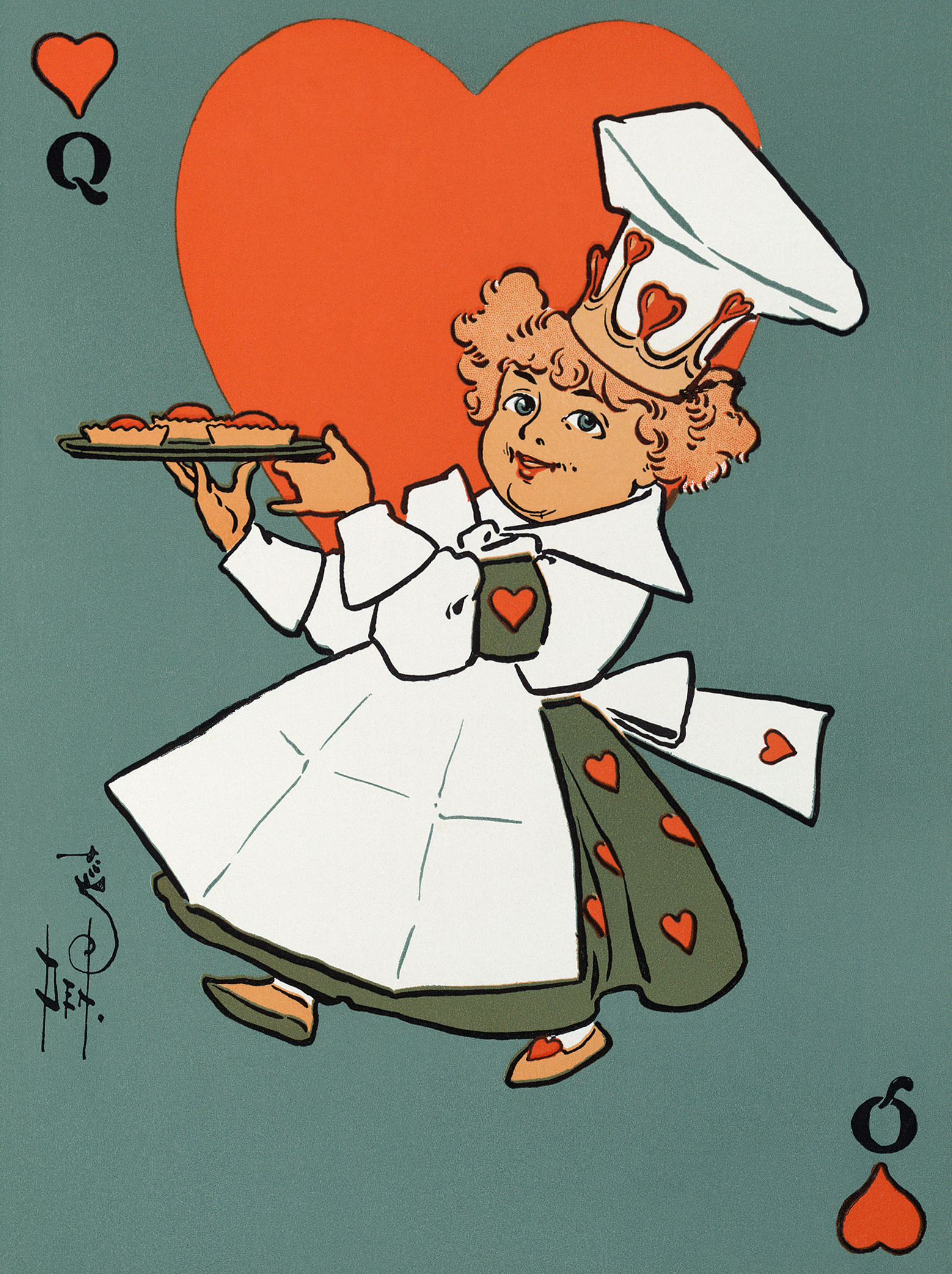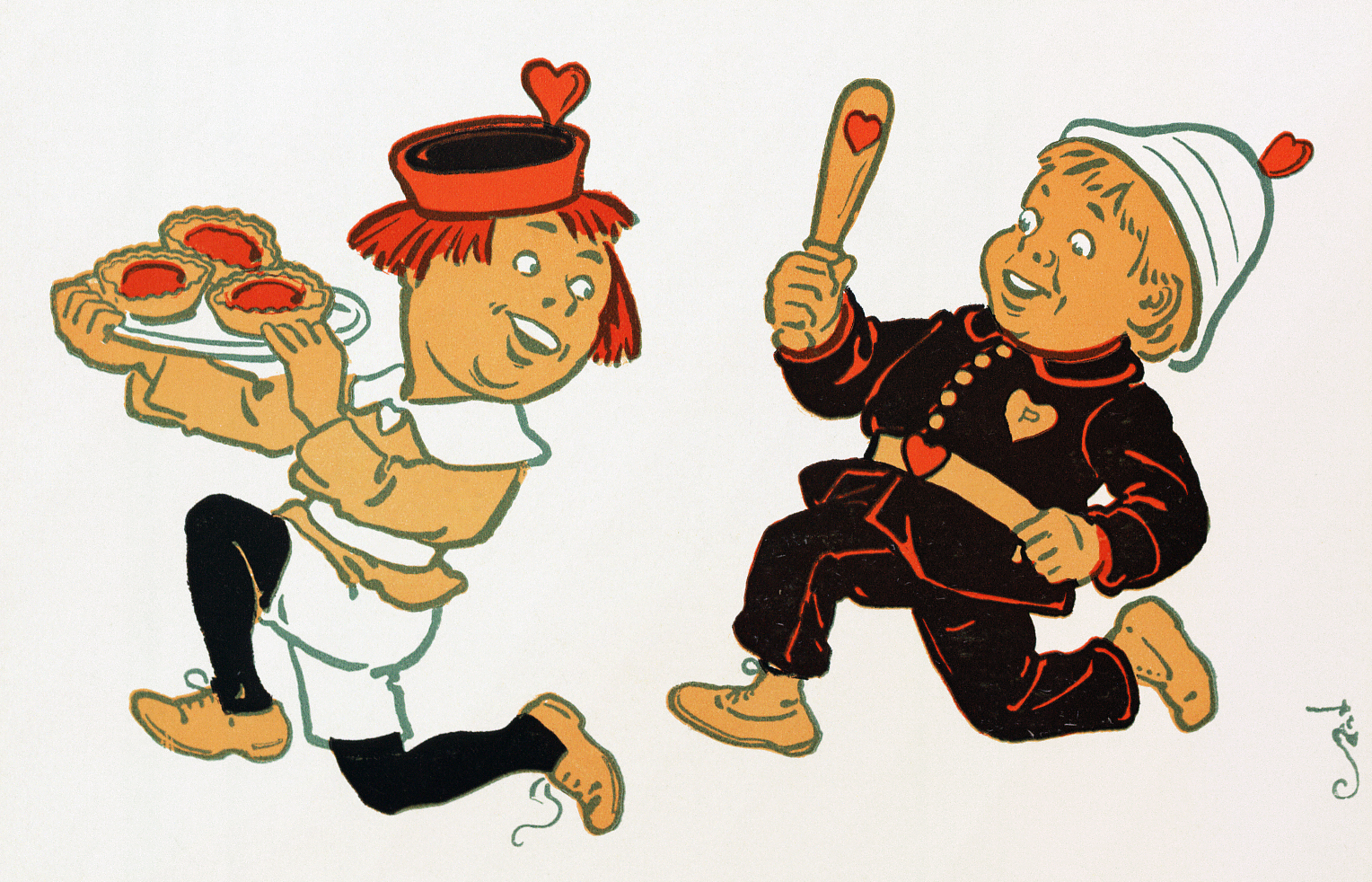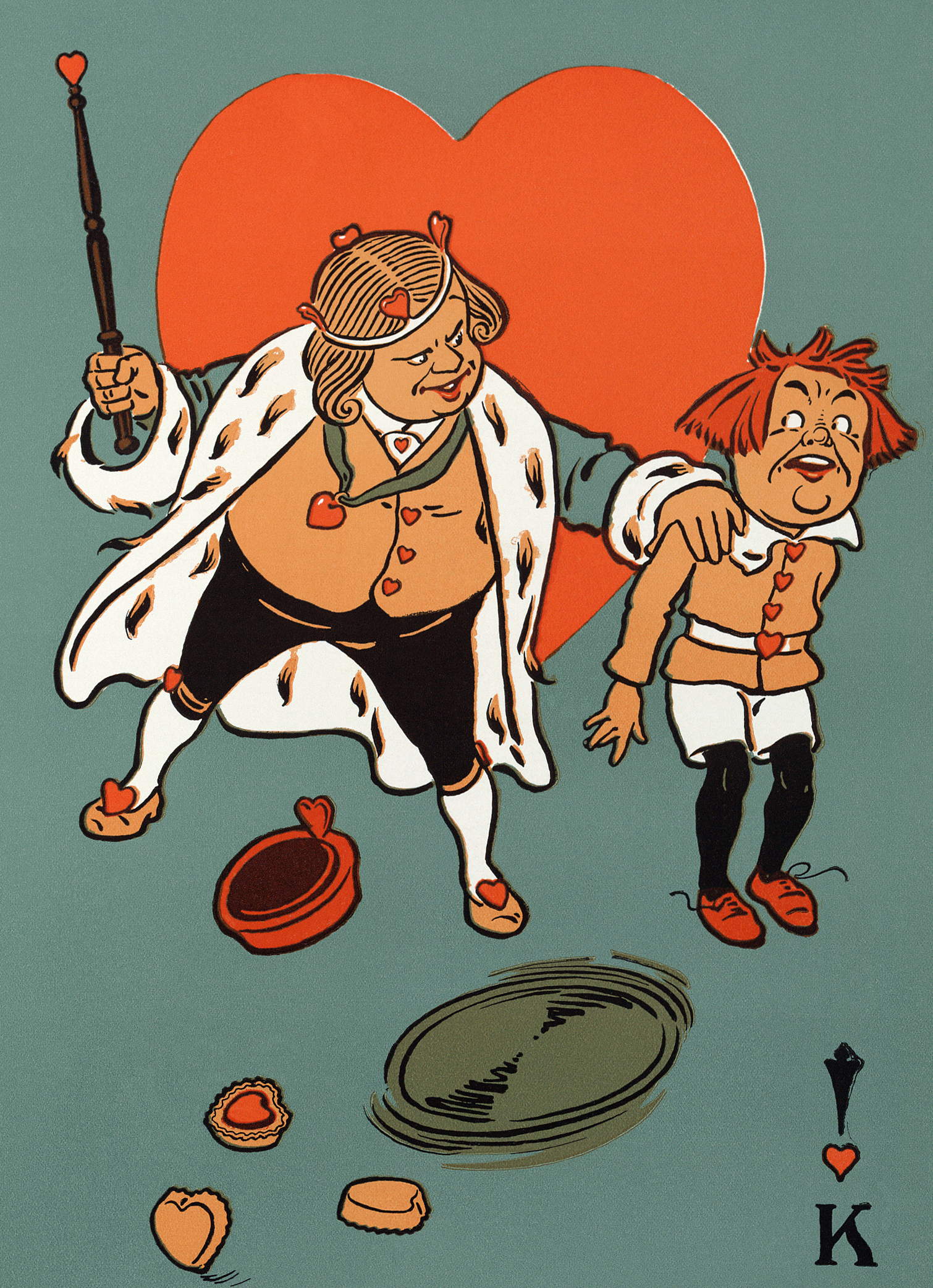The Queen of Hearts (poem) on:
[Wikipedia]
[Google]
[Amazon]
 "The Queen of Hearts" is an English poem and
"The Queen of Hearts" is an English poem and
HathiTrust
However,
 The other stanzas published with it deal with nothing besides the domestic arrangements of the other three suits: "The King of Spades" flirts with the maids, so the Queen of Spades has them beaten and drives them out. She relents when the Knave appeals to her on their behalf. "The King of Clubs" and his wife constantly fight, but the Knave refuses to second him. The author opines that royalty who fight like that should be punished. "The Diamond King" and his wife would get along perfectly, except the Knave tries to seduce her; the author encourages the King to
The other stanzas published with it deal with nothing besides the domestic arrangements of the other three suits: "The King of Spades" flirts with the maids, so the Queen of Spades has them beaten and drives them out. She relents when the Knave appeals to her on their behalf. "The King of Clubs" and his wife constantly fight, but the Knave refuses to second him. The author opines that royalty who fight like that should be punished. "The Diamond King" and his wife would get along perfectly, except the Knave tries to seduce her; the author encourages the King to
 There has been speculation about a model for the Queen of Hearts. In ''The Real Personage of Mother Goose'', Katherine Elwes Thomas claims the King and Queen of Hearts are based on
There has been speculation about a model for the Queen of Hearts. In ''The Real Personage of Mother Goose'', Katherine Elwes Thomas claims the King and Queen of Hearts are based on
"The King of Clubs" at Sweet Rhymes
{{DEFAULTSORT:Queen of Hearts (poem), The Children's poems English nursery rhymes English folk songs English children's songs Traditional children's songs Songs about queens Songs about crime Works originally published in British magazines Works published anonymously
 "The Queen of Hearts" is an English poem and
"The Queen of Hearts" is an English poem and nursery rhyme
A nursery rhyme is a traditional poem or song for children in Britain and many other countries, but usage of the term dates only from the late 18th/early 19th century. The term Mother Goose rhymes is interchangeable with nursery rhymes.
From t ...
based on the characters found on playing card
A playing card is a piece of specially prepared card stock, heavy paper, thin cardboard, plastic-coated paper, cotton-paper blend, or thin plastic that is marked with distinguishing motifs. Often the front (face) and back of each card has a fi ...
s, by an anonymous author
Anonymous works are works, such as art or literature, that have an anonymous, undisclosed, or unknown creator or author. In the case of very old works, the author's name may simply be lost over the course of history and time. There are a number ...
, originally published with three lesser-known stanzas, "The King of Spades", "The King of Clubs", and "The Diamond King", in the British publication ''The European Magazine
''The European Magazine'' (sometimes referred to as ''European Magazine'') was a monthly magazine published in London. Eighty-nine semi-annual volumes were published from 1782 until 1826. It was launched as the ''European Magazine, and London Rev ...
'', vol. 1, no. 4, in April 1782.Reichertz (2000), p. 93. But Reichertz got the issue number wrong. See ''The European Magazine, and London Review'', vol. 1, no. 4, Apr. 1782, p. 252, oHathiTrust
However,
Iona and Peter Opie
Iona Margaret Balfour Opie, (13 October 1923 – 23 October 2017) and Peter Mason Opie (25 November 1918 – 5 February 1982) were an English married team of folklorists who applied modern techniques to understanding children's literature and ...
have argued that there is evidence to suggest that these other stanzas were later additions to an older poem.
Synopsis and structure
The song relates that the Queen of Hearts bakes sometart
A tart is a baked dish consisting of a filling over a pastry base with an open top not covered with pastry. The pastry is usually shortcrust pastry; the filling may be sweet or savoury, though modern tarts are usually fruit-based, sometimes with ...
s. The Knave of Hearts then steals all of them. The King of Hearts (the husband of the Queen of Hearts) calls for the tarts and beats the Knave harshly. So the Knave returns them and pledges to not steal again.
:The Queen of Hearts
:She made some tarts,
:All on a summer's day;
:The Knave of Hearts
:He stole those tarts,
:And took them clean away.
:The King of Hearts
:Called for the tarts,
:And beat the knave full sore;
:The Knave of Hearts
:Brought back the tarts,
:And vowed he'd steal no more.
 The other stanzas published with it deal with nothing besides the domestic arrangements of the other three suits: "The King of Spades" flirts with the maids, so the Queen of Spades has them beaten and drives them out. She relents when the Knave appeals to her on their behalf. "The King of Clubs" and his wife constantly fight, but the Knave refuses to second him. The author opines that royalty who fight like that should be punished. "The Diamond King" and his wife would get along perfectly, except the Knave tries to seduce her; the author encourages the King to
The other stanzas published with it deal with nothing besides the domestic arrangements of the other three suits: "The King of Spades" flirts with the maids, so the Queen of Spades has them beaten and drives them out. She relents when the Knave appeals to her on their behalf. "The King of Clubs" and his wife constantly fight, but the Knave refuses to second him. The author opines that royalty who fight like that should be punished. "The Diamond King" and his wife would get along perfectly, except the Knave tries to seduce her; the author encourages the King to hang
Hang or Hanging may refer to:
People
* Choe Hang (disambiguation), various people
* Luciano Hang (born 1962/1963), Brazilian billionaire businessman
* Ren Hang (disambiguation), various people
Law
* Hanging, a form of capital punishment
Arts, e ...
the Knave.
"The Queen of Hearts" proved by far the most popular of the stanzas, and entered popular culture, while the others fell into obscurity. Although it was originally published in a magazine for adults, it eventually became best known as a nursery rhyme
A nursery rhyme is a traditional poem or song for children in Britain and many other countries, but usage of the term dates only from the late 18th/early 19th century. The term Mother Goose rhymes is interchangeable with nursery rhymes.
From t ...
. By 1785, it had been set to music.
Inspiration for characters
 There has been speculation about a model for the Queen of Hearts. In ''The Real Personage of Mother Goose'', Katherine Elwes Thomas claims the King and Queen of Hearts are based on
There has been speculation about a model for the Queen of Hearts. In ''The Real Personage of Mother Goose'', Katherine Elwes Thomas claims the King and Queen of Hearts are based on Elizabeth of Bohemia
Elizabeth Stuart (19 August 159613 February 1662) was Electress of the Palatinate and briefly Queen of Bohemia as the wife of Frederick V of the Palatinate. Since her husband's reign in Bohemia lasted for just one winter, she is called the Win ...
and the events that resulted in the outbreak of the Thirty Years War
The Thirty Years' War was one of the longest and List of wars and anthropogenic disasters by death toll, most destructive conflicts in History of Europe, European history, lasting from 1618 to 1648. Fought primarily in Central Europe, an es ...
. W. Gurney Benham, in his book ''Playing Cards: History of the Pack and Explanations of its Many Secrets'', notes that French playing card
A playing card is a piece of specially prepared card stock, heavy paper, thin cardboard, plastic-coated paper, cotton-paper blend, or thin plastic that is marked with distinguishing motifs. Often the front (face) and back of each card has a fi ...
s from the mid-17th century have Judith from the Hebrew Bible
The Hebrew Bible or Tanakh (;"Tanach"
''Random House Webster's Unabridged Dictionary''. Hebrew: ''Tān ...
as the Queen of Hearts. However, according to Benham, a scholar who researched the history of playing cards: "The old nursery rhyme about the Knave of Hearts who stole the tarts and was beaten for so doing by the King, seems to be founded on nothing more than the fact that 'hearts' rhymes with 'tarts'.", quoting W. Gurney Benham (1959), ''Playing Cards: History of the Pack and Explanations of its Many Secrets''
''Random House Webster's Unabridged Dictionary''. Hebrew: ''Tān ...
Adaptations
The poem's story is retold in a much expanded form in an 1805 poem known as ''King and Queen of Hearts: with the Rogueries of the Knave who stole the Queen's Pies'' byCharles Lamb
Charles Lamb (10 February 1775 – 27 December 1834) was an English essayist, poet, and antiquarian, best known for his ''Essays of Elia'' and for the children's book ''Tales from Shakespeare'', co-authored with his sister, Mary Lamb (1764–18 ...
, which gives each line of the original, followed by a poem commenting on the line.Lamb (1805) In 1844 Halliwell
Halliwell is a surname. It may refer to:
People
* Bryn Halliwell (born 1980), English football goalkeeper
* Danny Halliwell (born 1981), rugby league footballer who played in the 2000s and 2010s
* David Halliwell (1936–2006), British dramatis ...
included the poem in the 3rd Edition of his ''The Nursery Rhymes of England'' (though he dropped it from later editions) and Caldecott made it the subject of one of his 1881 "Picture Books", a series of illustrated nursery rhymes which he normally issued in pairs before Christmas from 1878 until his death in 1886.
"The Queen of Hearts" is quoted in and forms the basis for the plot of Lewis Carroll
Charles Lutwidge Dodgson (; 27 January 1832 – 14 January 1898), better known by his pen name Lewis Carroll, was an English author, poet and mathematician. His most notable works are ''Alice's Adventures in Wonderland'' (1865) and its sequel ...
's ''Alice's Adventures in Wonderland
''Alice's Adventures in Wonderland'' (commonly ''Alice in Wonderland'') is an 1865 English novel by Lewis Carroll. It details the story of a young girl named Alice (Alice's Adventures in Wonderland), Alice who falls through a rabbit hole into a ...
'', Chapter XI: "Who Stole the Tarts?",Carroll (1865) a chapter that lampoons the British legal system through means of the trial of the Knave of Hearts,Fordyce (1994), p. 134 where the rhyme is presented as evidence
Evidence for a proposition is what supports this proposition. It is usually understood as an indication that the supported proposition is true. What role evidence plays and how it is conceived varies from field to field.
In epistemology, evidenc ...
. The poem became more popular after its inclusion in Carroll's work.
In the 1972 film ''Alice's Adventures in Wonderland'', this nursery rhyme is sung by Michael Crawford
Michael Patrick Smith, (born 19 January 1942), known professionally as Michael Crawford, is an English tenor, actor and comedian.
Crawford is best known for playing both the hapless Frank Spencer in the sitcom ''Some Mothers Do 'Ave 'Em'' an ...
.
References
Bibliography
* * * * *External links
* * *The three other poem stanza"The King of Clubs" at Sweet Rhymes
{{DEFAULTSORT:Queen of Hearts (poem), The Children's poems English nursery rhymes English folk songs English children's songs Traditional children's songs Songs about queens Songs about crime Works originally published in British magazines Works published anonymously